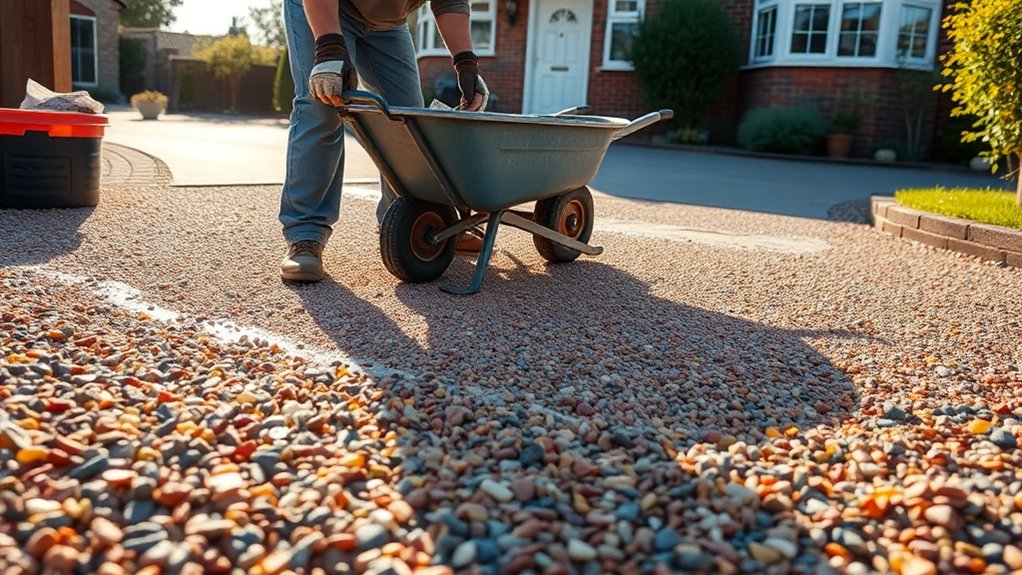Yes, you can install a resin-bound driveway on a budget with some smart choices. Consider using cost-effective materials such as basic aggregates or polymer-bound gravel kits. Proper site preparation is essential to avoid unexpected costs later on. Make sure to get itemised quotes from several contractors to ensure clarity and allow for comparison. You might also look into more affordable resin systems that still offer good durability. By following these tips, you can keep costs down while achieving a quality driveway.
Key Takeaways
- Choose simpler aggregate options or locally sourced gravel to cut material costs while still ensuring quality.
- Look into polymer-bound gravel kits or single-coat resin applications to save money without sacrificing durability.
- Proper site preparation is essential; hiring skilled contractors can help avoid costly repairs later due to poor groundwork.
- Get itemised quotes from several contractors to compare costs and ensure clear understanding of materials, labour, and preparation.
- Regular maintenance, such as sweeping and resealing, can extend the lifespan of your driveway, saving you money over time.
Understanding the Costs of Resin-Bound Driveways
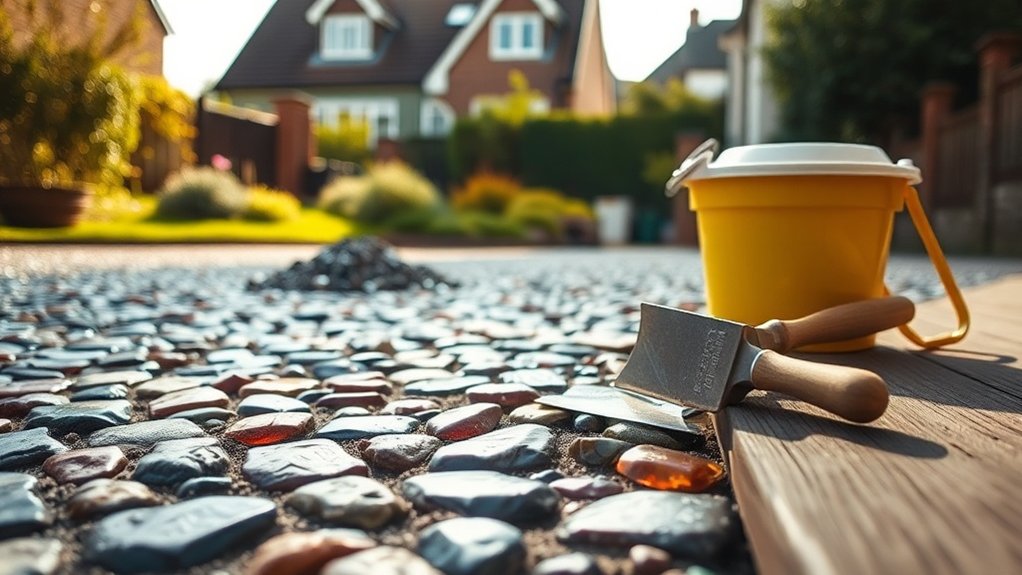
When considering a resin-bound driveway, it’s important to understand the costs, especially if you’re working with a limited budget. Typically, prices range from £50 to £150 per square metre, with total costs averaging between £2,800 and £10,000, depending on the size and materials you choose. For smaller driveways, you might pay between £1,500 and £2,500, while larger ones can become significantly more expensive. Factors such as the type of aggregate, resin, and groundwork can influence these costs. Properly installed driveways can last 15-25 years, which makes it a wise investment due to its durability and low maintenance needs. Average installation cost in the UK is around £3,000, which is essential to consider when budgeting for your project. It’s essential to weigh the upfront costs against the long-term benefits when making your decision.
Budget-Friendly Materials and Patterns
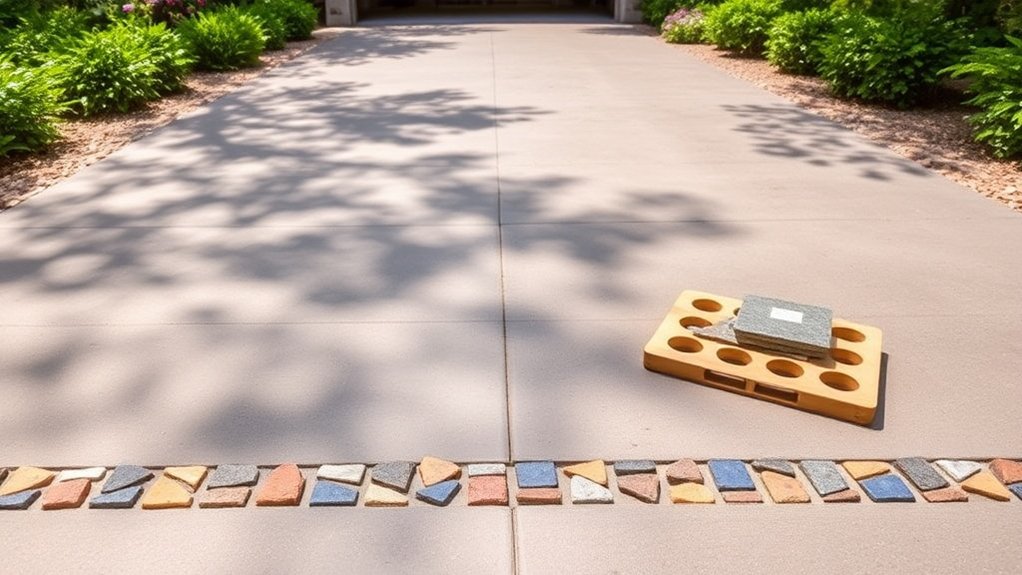
When planning your resin-bound driveway, choosing simple aggregate options can significantly reduce costs without compromising on quality. By selecting budget-friendly materials, you can create a durable surface that fits within your financial plan. Think about how the right choice of aggregates and patterns can enhance both the look and affordability of your driveway. For instance, using locally sourced gravel can save you money while still adding a stylish finish. Additionally, opting for a cost-effective and highly customizable finish can help you stay within your budget while achieving a beautiful result. Ensuring that your selected aggregates meet British Standards for size and durability will further enhance the reliability of your driveway while keeping costs manageable.
Simple Aggregate Options
Exploring simple aggregate options can significantly reduce the cost of your resin-bound driveway project. By selecting affordable aggregates, such as basic gravel like limestone or quartz, you can keep expenses down. Sourcing materials locally and opting for pre-mixed colour blends also contribute to savings. Additionally, using a resin-bound driveway provides low maintenance benefits, ensuring your investment remains cost-effective over time. The durability and longevity of resin-bound gravel ensures that your budget-friendly choice will stand the test of time.
Here’s a quick comparison of aggregate options:
| Aggregate Type | Cost-Effectiveness |
|---|---|
| Basic Gravel | High |
| Locally Sourced | High |
| Recycled Aggregates | Medium |
| Custom Blends | Low |
Choosing natural earth tones and single-tone finishes is a budget-friendly strategy. Simple patterns, such as seamless finishes, help lower both labour and material costs. These choices ensure a stunning driveway without breaking the bank.
Cost-Effective Material Choices
Cost-effective material choices are crucial for anyone wanting to create an attractive resin-bound driveway without breaking the bank. Consider using polymer-bound gravel kits, which can significantly lower costs compared to high-strength resin systems.
Look for lower-cost resin suppliers, but ensure the resin’s properties, such as UV stability and durability, meet your requirements.
For decorative areas, a single-coat resin application reduces resin usage. When choosing aggregates, opt for locally sourced materials with uniform sizes or mono-colour blends to save money.
Crushed concrete is a great option for a permeable sub-base, as it’s both stable and affordable.
Lastly, ensure uniform depth installation techniques to minimise waste and maintain quality, making your budget-friendly project both efficient and visually appealing.
The Importance of Site Preparation
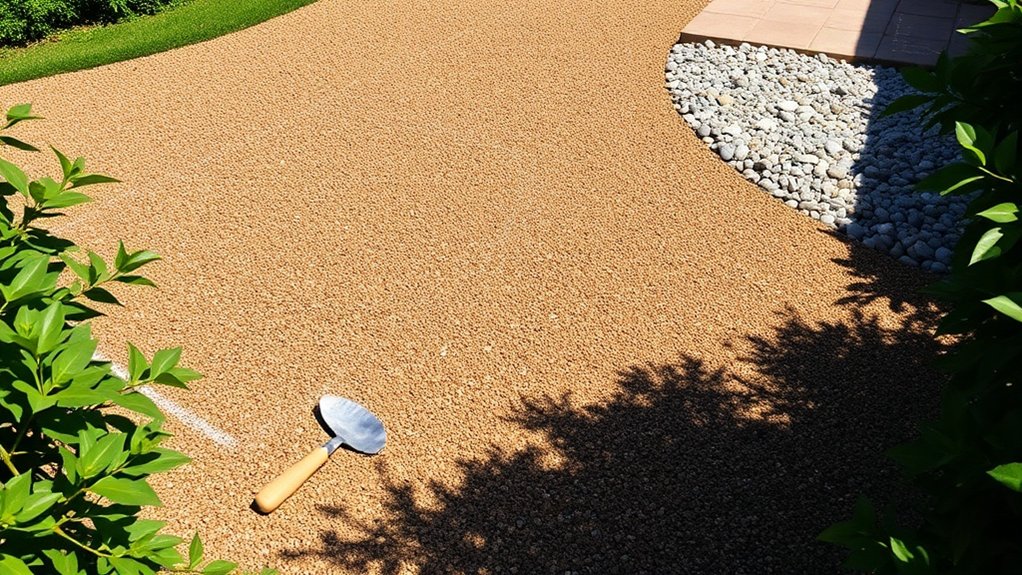
Before installing your resin-bound driveway, it’s essential to carefully assess the existing surface conditions.
Understanding the groundwork costs and ensuring proper drainage are crucial steps that can prevent future headaches and expenses.
For example, if you overlook drainage issues, you may end up with water pooling, which can weaken your driveway and lead to costly repairs.
Taking the time to address these factors now can save you from unnecessary financial strain later on.
Assessing Existing Surface Conditions
Before you install a resin-bound driveway, it’s crucial to assess the existing surface conditions. A thorough inspection will help you identify cracks, potholes, and other damages. Make a note of these issues for future repairs, and prioritise fixing them to avoid any future problems.
| Surface Condition | Action Required |
|---|---|
| Cracks and Potholes | Repair before installation |
| Vegetation | Clear all organic matter |
| Standing Water | Eliminate moisture |
Ignoring surface damage can result in an uneven finish, as the resin will accentuate imperfections. By ensuring a solid foundation, you’ll improve both the durability and appearance of your driveway.
Groundwork Cost Considerations
After assessing the existing surface conditions, it’s crucial to consider groundwork costs for a successful resin-bound driveway installation.
Groundwork typically constitutes a significant part of your budget, usually between £1 and £2 per square foot. You’ll need to clear away debris and ensure a stable base to avoid future cracks or subsidence.
Proper compaction and levelling of the foundation are vital; poor preparation can lead to expensive repairs down the line. While flat sites may be cheaper, sloped areas usually cost more to prepare.
Hiring skilled contractors can help prevent hidden costs from inadequate site preparation. Remember, skimping on groundwork may save you money initially, but it could compromise the durability and lifespan of your driveway.
Importance of Proper Drainage
To ensure your resin-bound driveway lasts and performs well, proper drainage is crucial. Even though resin is permeable, it can still lead to pooling if adequate drainage measures aren’t in place.
If you live in an area with heavy rainfall, consider installing additional drainage systems to avoid waterlogging. Make sure your site is graded correctly to direct water away from the driveway; uneven slopes can cause localised flooding and damage.
A permeable sub-base is also vital; without it, trapped water can lead to frost damage and premature wear. By integrating effective drainage solutions during the site preparation, you’ll improve the durability and performance of your driveway while complying with Sustainable Urban Drainage Systems (SuDS) standards.
Comparing Installation Quotes
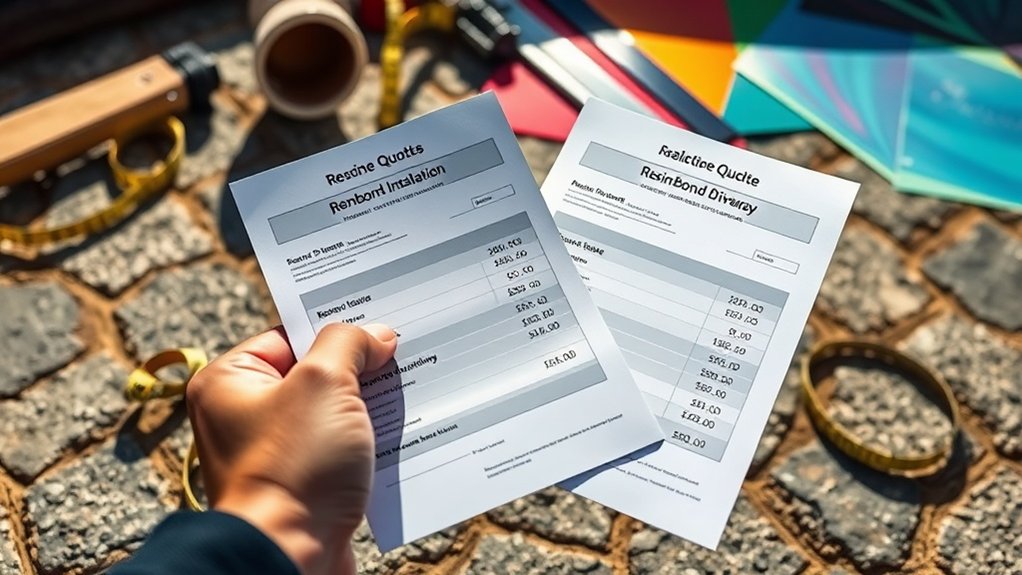
How can you ensure you’re getting the best value when comparing installation quotes for your resin-bound driveway? Start by asking for itemised breakdowns from several contractors.
Make sure they clarify costs for materials, labour, and site preparation. Understand the scope of work—does the quote include everything from the sub-base to the resin layer?
When negotiating quotes, consider the installation timelines; a quicker job might save you money, but ensure quality isn’t compromised.
Also, check the quality of materials specified, especially UV-resistant resins and aggregates. By evaluating these factors carefully, you can make a well-informed decision that fits your budget while ensuring a durable and attractive driveway.
Assessing Alternative Driveway Surfaces
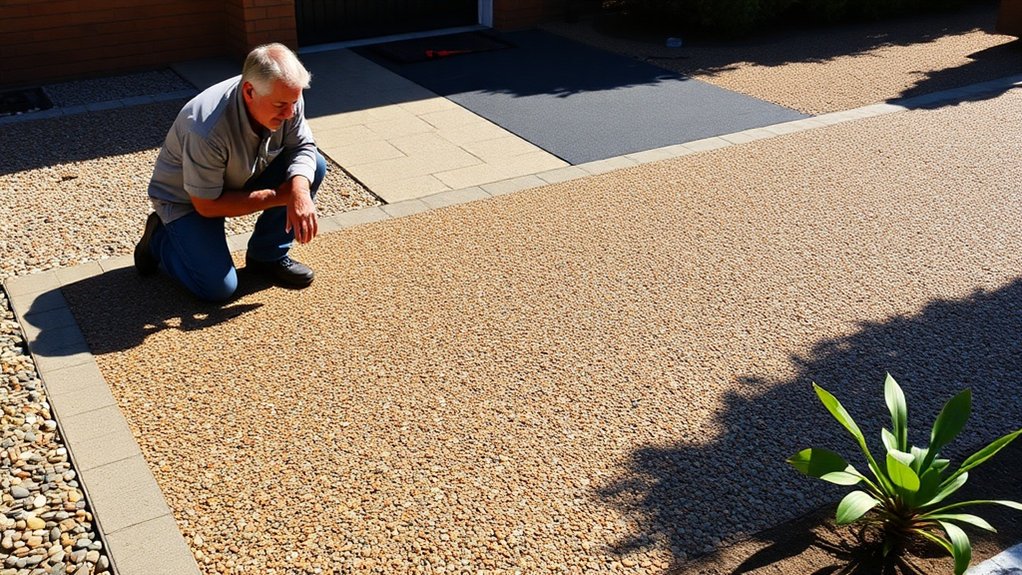
When considering alternative driveway surfaces, it’s important to balance cost with durability and maintenance.
Resin-bound driveways are known for their longevity and minimal upkeep, making them a solid investment.
On the other hand, options like block paving and concrete may be cheaper initially but often require more frequent repairs, which can add to your costs over time.
Cost Comparison Analysis
When choosing a new driveway surface, it’s important to compare costs with their long-term value.
Resin-bound driveways, costing between £11 and £17 per square foot, offer exceptional durability and visual appeal, often justifying their higher initial cost.
Tarmac may save you money upfront, but it typically needs resurfacing every 10 to 15 years, which can add to overall expenses.
Concrete and block paving are moderately priced but may require ongoing maintenance, like re-sanding and weed control, which can also increase lifetime costs.
While options like tarmac or concrete might seem cheaper initially, they may not provide the same lasting beauty and low maintenance that resin-bound surfaces do, making resin a worthwhile investment over time.
Durability and Maintenance
Resin-bound driveways are known for their durability and require minimal maintenance. However, it’s wise to explore other options to ensure you make the best choice for your property.
Asphalt is a more affordable alternative but deteriorates quickly, typically needing resurfacing every 8-12 years.
Concrete is durable but can crack and stain, necessitating regular sealing and patching.
Gravel may have lower upfront costs, but it requires frequent replenishing and weed control to maintain its appearance.
Each option comes with its own maintenance needs: for resin, a regular sweep and gentle wash will help it last longer.
Asphalt and concrete benefit from sealing to prevent wear and tear.
Consider these factors to choose a driveway that fits your budget and maintenance preferences.
Key Installation Considerations
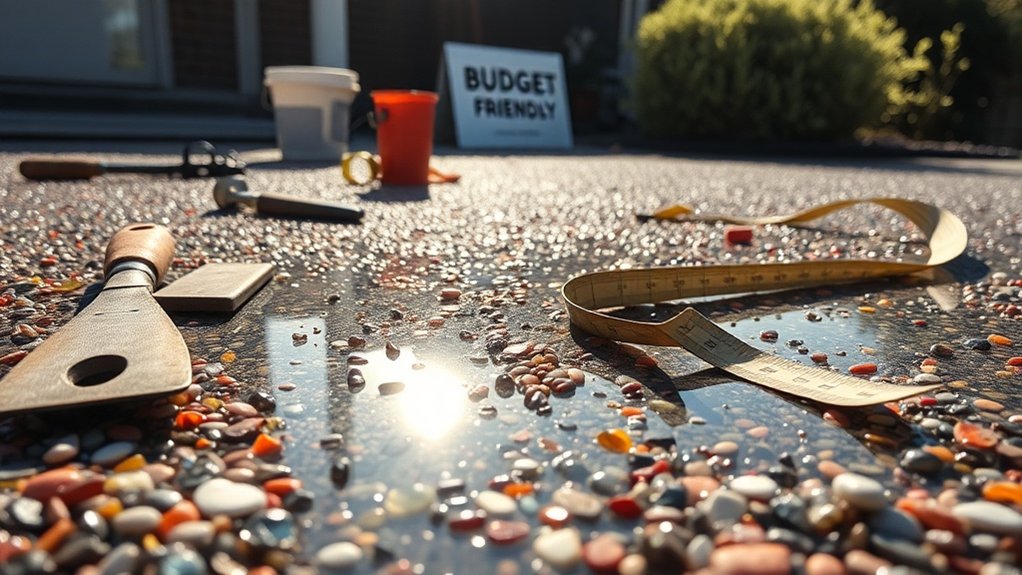
To ensure a successful resin-bound driveway installation, it’s crucial to pay close attention to several key considerations. Neglecting these could result in installation issues and ongoing maintenance problems.
| Consideration | Importance |
|---|---|
| Sub-base Preparation | Provides stability and prevents shifting |
| Surface Cleanliness | Ensures proper adhesion of the resin |
| Mixing Ratios | Guarantees the desired durability |
| Layer Thickness | Supports the weight of vehicles |
| Weather Conditions | Influences curing and overall quality |
Proper excavation and a suitable sub-base are essential. Make sure the surface is clean and dry before mixing the resin and aggregate in the correct ratios. Lastly, avoid any disturbances during the curing process to achieve a flawless finish.
Maintenance Requirements and Longevity
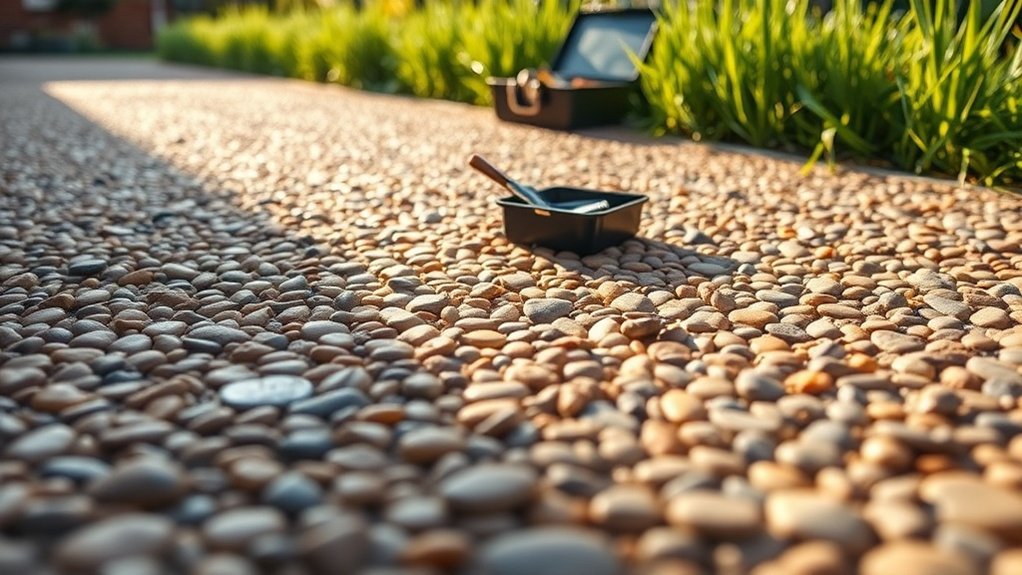
Maintaining a resin-bound driveway is crucial for its longevity and appearance, as neglect can lead to expensive repairs. For optimal upkeep, sweep your driveway weekly and give it a gentle pressure wash every six months.
When tackling stains, use pH-neutral detergents and steer clear of harsh chemicals.
Seasonal maintenance is key: check for any winter damage in spring and clear fallen leaves in autumn.
To prolong your driveway’s life, consider sealing it every 3 to 5 years and using wooden planks under jacks when lifting vehicles to avoid surface damage.
Address spills promptly and ensure drainage channels are clear to maintain good permeability.
Financial Trade-Offs of Resin Driveways
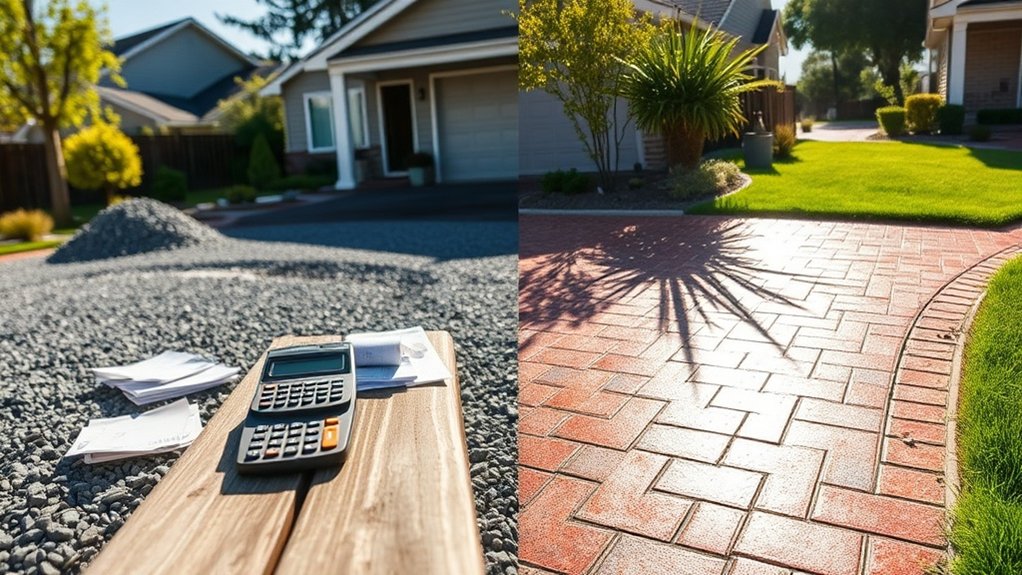
When considering a resin driveway, it’s important to understand the financial trade-offs involved. Resin driveways are known for their durability and long-term cost-effectiveness, but the initial investment can put a strain on your budget.
Choosing cheaper materials may save you money at first, but it could compromise quality, impacting both the appearance and lifespan of the driveway. If you decide to skimp on essential base preparation to save costs, you might end up facing expensive repairs later on.
Finding a balance between bonded and bound systems can help you stay within your financial limits, but keep in mind that opting for higher-quality resins and professional installation can reduce future maintenance costs.
Ultimately, consider immediate savings against potential long-term expenses to make an informed choice.
Strategies for Reducing Installation Costs
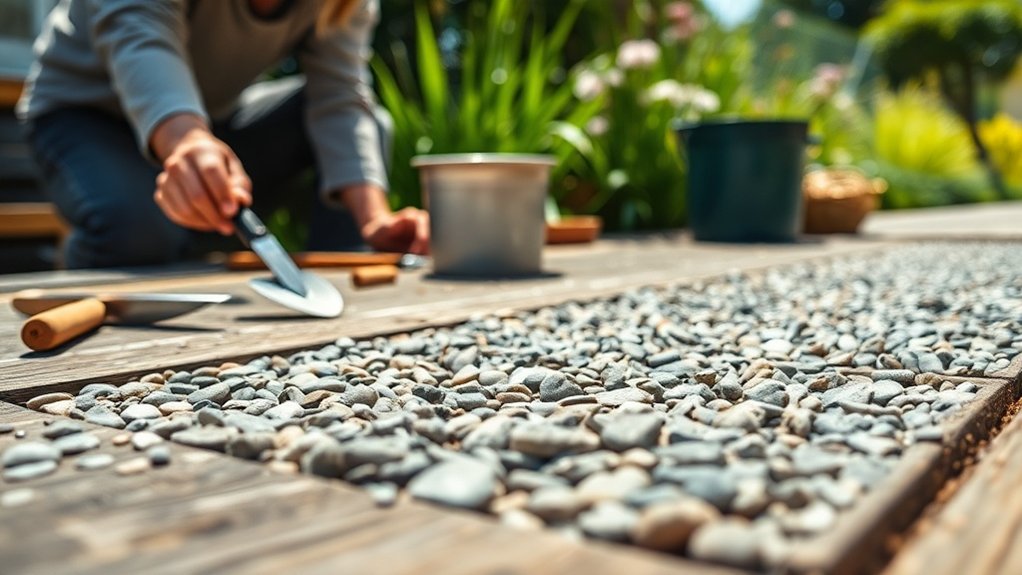
When budgeting for a resin-bound driveway, consider practical strategies to reduce installation costs without compromising on quality.
Start by opting for standard resin and aggregates rather than premium options to stay within your budget. Bonded resin systems can also help minimise material requirements. If you’re taking on a larger project, buying in bulk can save you money through economies of scale.
To keep costs down, optimise site preparation by using existing stable bases and selecting cost-effective foundation layers, such as tarmac.
If you’re handy, doing tasks like site clearing yourself can significantly reduce labour expenses. Additionally, simplifying the shape of your driveway and scheduling installations during off-peak times can further ease financial pressure.
These straightforward techniques can help you achieve your driveway goals while keeping costs manageable.
Evaluating Lifecycle Costs
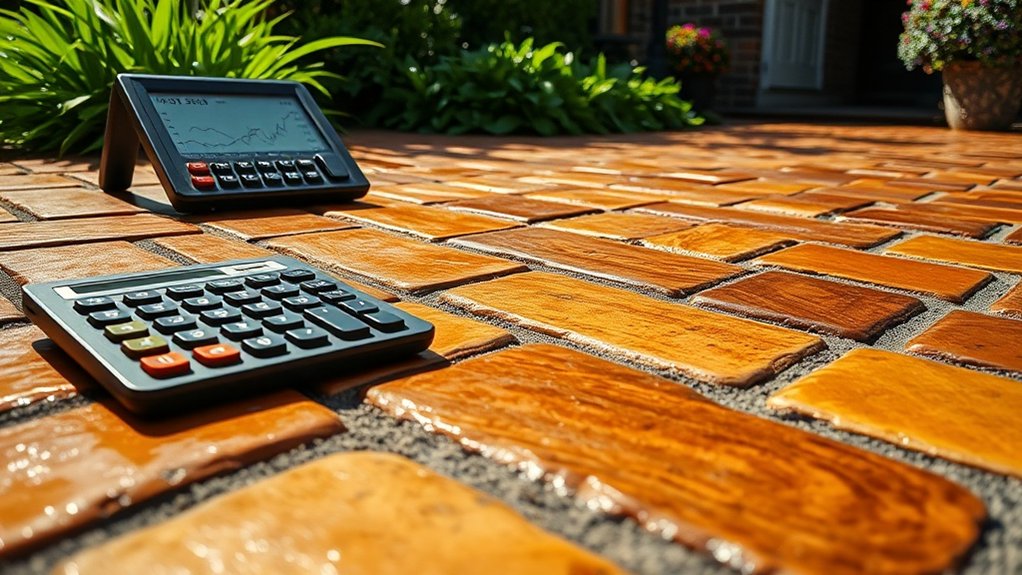
Evaluating lifecycle costs is crucial when considering a resin-bound driveway. The initial installation costs range from £60 to £120 per square metre, which is higher than tarmac or gravel.
However, the durability and lower maintenance requirements of resin driveways lead to significant savings over time.
When calculating costs, include annual maintenance, which typically ranges from £150 to £300. Additionally, you’ll need to factor in resealing every 3 to 5 years, costing about £10-15 per square metre.
With a lifespan of 15 to 25 years, resin driveways help minimise unexpected expenses, making them a worthwhile investment for your property.
Enhancing Property Value With Resin Driveways
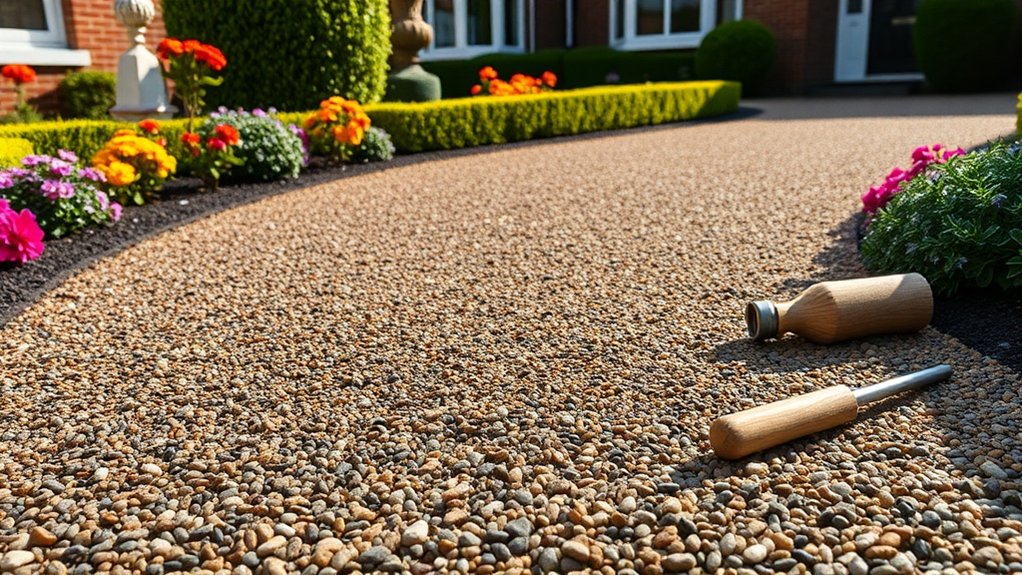
Investing in a resin-bound driveway not only enhances the look of your property but can also increase its value by 5-20%, depending on quality and installation.
A smooth finish and a range of customisation options improve curb appeal, making a strong first impression on potential buyers.
Resin driveways are durable and require minimal maintenance, ensuring they stay looking good for longer, which reflects positively on overall property upkeep.
Plus, their eco-friendly and permeable nature can attract environmentally conscious buyers.
Frequently Asked Questions
Can I Install a Resin-Bound Driveway Myself to Save Costs?
Yes, you can install a resin-bound driveway yourself. By using DIY methods and cost-effective options like pre-measured kits, you can create a sturdy surface while saving money. Just ensure you prepare the area properly to get the best results.
What Is the Typical Lifespan of a Resin-Bound Driveway?
A properly installed resin-bound driveway can last between 15 to 30 years. To ensure its longevity, it’s important to follow some simple maintenance tips. Reseal the surface every five years and steer clear of harsh chemicals. This will help maintain its appearance and structural integrity over the years.
Are There Eco-Friendly Resin Options Available?
Yes, there are eco-friendly resin options available that use sustainable materials and biodegradable components. These alternatives not only reduce environmental impact but also improve durability, ensuring your driveway stays functional and attractive for years to come.
How Does Weather Affect Resin Driveway Installation?
How can weather not impact your resin driveway installation? Temperature and moisture play crucial roles; warm weather speeds up curing, while rain can damage the appearance and strength of the surface. For instance, installing in wet conditions can lead to problems like discolouration and reduced longevity. Therefore, careful planning around the weather is essential for a successful installation.
Can I Use Recycled Materials for a Resin-Bound Driveway?
Yes, you can use recycled aggregates for a resin-bound driveway. This method not only saves you money but also boosts durability and is environmentally friendly. For example, using recycled materials like crushed concrete or glass can create a sustainable surface that looks great without compromising on quality.
Conclusion
In conclusion, installing a resin-bound driveway on a tight budget is achievable with some careful planning. By choosing cost-effective materials, preparing the site yourself, and possibly opting for a DIY installation, you can create an attractive driveway without overspending. Remember, the decisions you make now can affect both your current finances and your property’s future value. Are you ready to invest in a budget-friendly design that lasts? The choice is yours.
